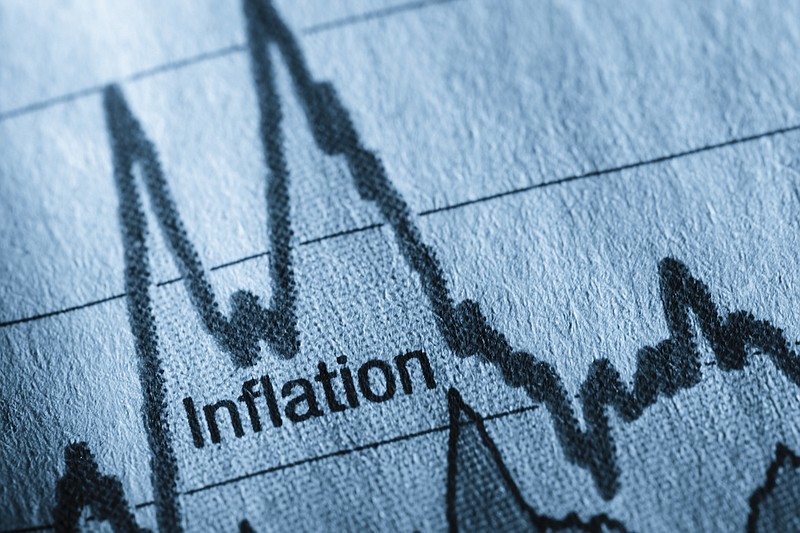Inflation rose last year at the fastest pace in 40 years, raising prices for food, housing and other consumer goods nearly twice as much as the wage gains paid to the typical worker.
A combination of pent-up consumer demand, supply chain disruptions and a tight labor market drove prices up an average of 8.3% during 2022. Many workers enjoyed their biggest nominal wage increases in 2022 with private sector wage rates up by more than 5% in 2022. But that didn't keep pace with inflation, cutting the real income of most workers.
Surveys indicate Chattanooga prices, on average, are about 8% below the national average with lower costs for housing, utilities, taxes and labor in Chattanooga compared with the U.S. average. But the average pay for Chattanooga workers is even lower, averaging 15.8% below the U.S. average, according to the U.S. Bureau of Labor Statistics.
Inflation has emerged as public enemy No. 1 for the Federal Reserve Board, which has steadily raised interest rates since March 2022 to try to slow down demand and bring inflation back down to the Fed's 2% long-term target. Inflation has shown signs of moderating from last year's peaks as supply chain pressures have eased and commodity prices have dropped. But the Fed has indicated further rate hikes are likely in 2023, which are likely to slow the economy to limit inflation but also could push the economy into a recession.
The inflation fight is analyzed by a Chattanooga human resources consultant, a University of Tennessee at Chattanooga economist and a worker who has suffered from higher prices.
MERRI MAI WILLIAMSON
Merri Mai Williamson has worked in human resources for more than 30 years and holds two national certifications at the highest level. She opened her own background-checking business, Application Researchers, more than 28 years ago, which now serves clients in five countries. In 2019, she founded a human resources consulting firm, HR Master Consultants. Williamson also has served in many volunteer leadership roles, including chair of the Advisory Board for the Gary W. Rollins College of Business at the University of Tennessee at Chattanooga, and president of SHRM Chattanooga (now known as Southeast TN SHRM).
Q. What impact is inflation having on wages?
A. With inflation rising and an employee's "real wage" (the amount of a product or service you can actually buy) decreasing, employers are forced to think more creatively about how they compensate their most valuable asset. This challenge comes during the most competitive recruiting era most of us have ever seen when bonuses were offered to new employees and waiting periods were waived for benefits and paid time off was increased. Company resources have been stretched and expanded, to combat the issues, which inflation and competition for talent have created.
Q. Historically, have you seen wage increases like this before?
A. In 30 years as a human resource professional, I have not experienced a time when non-unionized employees had so much influence over their "total rewards" (compensation, benefits and other forms of appreciation). From the onset of COVID, the word "unprecedented" was overused and lost the strength of its meaning. However, I believe it is safe to say that the wage increases we are now experiencing are, in fact, unprecedented.
Q. What is your outlook for wages in 2023?
A. The experts are predicting that inflation will continue to decline; yet, employees are still receiving higher wages, with the average compensation increasing by over 4%. Some would argue that 'it is about time' and that wages may actually be more commensurate with the work performed.
Employees will clearly be the winners in this scenario, while companies try to rein in costs, expand profitability -- and recruit/retain top talent. However, even with the continued increased cost in health insurance and other benefits, employers cannot afford to lessen the benefits offerings in such a competitive environment.
Q. How have company costs increased?
A. Health benefits costs have increased for employers from 2022 to 2023; and although most employers experience this every year, the average rate exceeds what is normally projected and expected. Some employers have realized a 3% increase in premiums, while most saw 2–3% above what had been budgeted. Additionally, with the increases in wages, employment taxes and costs associated with paid time off are logically more of a consideration.
Q. Are companies being able to pass higher costs of operations on to customers? Are customers able to pay higher prices?
A. In some industries, the higher costs of operations are passed on to consumers; not all industries have that luxury. Some employers have seen a decrease in profits year-over-year, while others are literally taking advantage of the situation and noting more zeroes on their bottom line.
I would say the sector hardest hit by increased costs are small businesses as they have to remain competitive without the vast resources held by larger organizations. Speaking from my own experience, the clients of my background checking company have only realized five across-the-board price increases in 28 years; but current economic conditions dictate a modest increase, to remain competitive and still have the resources to attract and retain the talent my clients have come to expect.
However, raising prices does not automatically ensure increased revenues, as a customer's loyalty can only buy what they can afford.
CLAUDIA WILLIAMSON KRAMER
Claudia Williamson Kramer currently serves as the Probasco Chair of Free Enterprise at the University of Tennessee at Chattanooga, where she is an instructor at the undergraduate and doctoral levels. The mission of the chair is to study the American free enterprise system, engage in scholarly research and contribute to the public's understanding of economics. She has authored a wide variety of materials including journal articles, books, book reviews and policy briefs. Her research has also appeared in press outlets such as The Economist and the BBC.
Q. Could you help put our current economy into historic perspective in terms of inflation?
A. We are seeing the highest inflation rates we have seen in this country since the stagflation era of the 1970's. One major difference between now and the 1970s is that we are allowing prices to rise -- which is a good thing. There is public outcry for politicians to "control" prices by making it illegal for prices to rise; however, that will only make things worse. In the 1970s, we experienced long lines at gas pumps precisely because we didn't fully allow prices to rise at the level of inflation. Not allowing prices to rise results in shortages and misallocation of goods and services.
Q. How is inflation affecting the local economy?
A. Inflation tends to have the most negative impact on working people. Wages tend to be less flexible than other prices, which results in losses of real income for working people. It primarily benefits those who hold large debts (like the federal government), allowing debt holders to pay back their debts in less valuable nominal dollars.
Q. What is your outlook for rates in 2023?
A. In order to check inflation, rates would likely need to continue to rise substantially. Unfortunately, the Federal Reserve faces political pressures to keep rates low and is unlikely to take the necessary steps. Only the market can determine correct interest rates, and the Federal Reserve at its best is guessing what interest rates should be.
Q. Will the Federal Reserve raising rates result in a recession during 2023?
A. If there is a recession in 2023, it will have been caused by the loose monetary policy of the last 20 years creating a massive bubble. The bubble was always going to pop resulting in a recession. Raising rates might just be the pin that popped the bubble.
ZACK SCOGGINS
Zack Scoggins, 31, is employed at a kiosk in the Northgate Mall in Hixson. He began the job at the beginning of 2022 at $12 an hour, and after several months, he was made a full-time employee at $17 an hour. The day after Christmas, he received news that his hours will again be reduced to half time. He's a life-long resident of the Chattanooga area, holds a bachelor's degree in literature, reading and writing from the University of Tennessee at Chattanooga and currently resides in East Ridge, where he shares a house with two roommates.
Q. How has inflation affected your finances?
A. It's been the cost of groceries, mainly. I spend about $100 to $150 a week on groceries. That's about the amount I spent before the rise in prices, but now I get less for that amount. Prices have made me more selective. I concentrate more on the necessities than creature comforts.
I've resorted to buying pre-prepped meals because they're affordable, fairly cheap. There's not a lot of food waste. I get them from Publix for about $7.50. I can wake up, turn on the oven, they only take a few minutes to cook, and that does me for lunch. When I get home after work, I have to decide about whether to stop at McDonald's, which is normally about $5 for two McDoubles.
Q. Have you had to cut expenses? How are you coping with the higher cost of living?
A. One thing is that I go out to restaurants and bars less often. I don't see the point of going out and paying $8 for a pint of craft beer when I can get a pack of beer for $12. In some ways I do miss going out, but then I'm also fine being a homebody, as well. The only times I go out now would be to see a show in Atlanta or Huntsville, Alabama, where I can stay with friends.
Rent has been affordable for me, so far. I live in a house with two roommates, and one of them owns the home. Rent went up by $30 in 2022 and then again by $30 in January of this year.
One big problem is that it's hard to put money into savings. It was difficult during the holidays, for example. There have been times I've had to withdraw from savings for food or gas or necessities -- or just to do something for myself, like take a trip.
Right after the holidays, the company cut hours and, as of right now, I'm having to be even more mindful of money. I've been trying to save money for a down payment on a car, and for the foreseeable future, I will need to use my savings for rent and bills.
READ MORE
What should you do with your money in 2023 after last year’s downturn?: Interest rates
What should you do with your money in 2023 after last year’s downturn?: Investments



